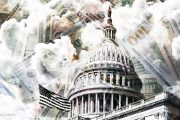
There is mob rule — and then there is glorified mob rule. The former is obvious, such as when an uncontrolled group of men summarily hangs a person without trial or due process. Glorified mob rule is subtler, possessing a thin veneer of propriety and legality, such as a “democratic” determination or action contrary to the rule of law.
An example of portraying mob rule as something nobler would be how Representative Nancy Pelosi (D-Calif.) called the 2011 left-wing-protester invasion of the Wisconsin Capitol — which became the longest demonstrator occupation of a government building in U.S. history — an “impressive show of democracy in action.” Pelosi isn’t alone in her party in this thinking, either, says one writer; rather, “mobocracy” is now the Democrats’ default mode.
After discussing subjects such as what he calls Democrats’ “death fears,” commentator James Lewis addresses the dangerous mob phenomenon, writing at American Thinker:
Mob activity is so ancient that it was described by Plato and Shakespeare, centuries ago. Socrates was ordered to kill himself at the orders of a maddened Athenian assembly. … Jesus was also executed to satisfy a mob. Plato wrote that “mobocracy” was the worst kind of government, and he saw mobs in the streets of Athens many times in his life.
The U.S. Constitution was written to restrain that mob tendency in humans, and the Democrats used to understand that. …
It is obvious that Joe Biden and his cohort are deliberately whipping up anger and resentment between “identity groups,” which is how you split up a healthy society and make it weak and self-destructive.
Because China saw raging mobs during the Mao era, it is possible that this is being manipulated by Chinese front groups. But Iran and Russia have also seen out-of-control mobs burning, killing, and looting in the last century. Vladimir Lenin openly encouraged mob lynching of Ukrainian peasants, a trauma that shapes the war in Ukraine today. Radical jihadists routinely engage in mob politics, which is why so many Muslim societies have been frozen in the past.
The U.S. Constitution emerged in the time of the French Revolution, which saw mobs running wild in the streets of Paris.
Other Europeans were shocked at French society’s collapse, do note (the French Revolution, unlike ours, was a bloody, rabidly left-wing affair). Lewis points out, too, that Americans who read news from abroad perhaps well understood that constitutional checks and balances would be necessary to prevent mob chaos in the young U.S.
Of course, mob action can be intensely satisfying emotionally, for a time, because a mob member enjoys the immediate gratification of getting what he thinks he wants without delay. Yet it’s as a drug high: You eventually come down off it — and sometimes crash hard and are left empty.
Just consider the Socrates story, which, coincidentally, I just mentioned Wednesday. When the Athenian “mob” — which had that veneer of legitimacy called “democratic action” — came down off its high, it regretted having executed the philosopher. The democrats then erected a statue in his honor. So they could’ve had flesh-and-blood Socrates, but acted like blockheads instead and ended up with just a piece of stone.
To paraphrase German philosopher Georg Hegel, however, “We learn from history that we do not learn from history.” Lewis points out that now, “Democrat politicians and media routinely encourage chaos in a sly and deniable way” and that the “hard left has a long, long history of whipping up mobs.” Of course, though, perhaps the Machiavellian civilization destroyers do know history well enough to grasp that this strategy, destabilization (the second stage in the Marxist subversion model), is necessary to overturn the existing order and seize power.
Regardless, mobocracy is now the Democratic norm. In 2020, there were 600-plus violent BLM/Antifa riots, causing billions in property damage and costing numerous lives. What was the Democratic reaction?
Kamala Harris promoted a bail fund for rioters in Minnesota. Moreover, Harris actually said in a June 2020 interview on The Late Show with Stephen Colbert, almost giddily, that the “protests” “should not” stop.
Then, “Seattle Mayor Jenny Durkan described her city’s ‘autonomous zone,’ which was forcibly taken over by armed protesters and where a black teenager would later be shot dead, as a ‘block party atmosphere,’” Spectator USA reminded us in 2020. “Speaker Nancy Pelosi responded to the toppling of a statue of Christopher Columbus by giving a wave of her hand: ‘people will do what they do.’ Rep. Ayanna Pressley went several steps further than her peers, encouraging ‘unrest in the streets’ during an MSNBC interview in August.”
There also was thug-like representative Maxine Waters (D-Calif.), who in 2018 encouraged people to “create a crowd” and “harass” Trump officials in public.
Then there are attacks on our Constitution, which the Left doesn’t like because, as I put it Wednesday, it serves as a “firewall against … legislative ‘mob justice.’” Trump’s recent conviction in New York was part of this, too, as the rule of law was ignored in deference to an angry leftist mob of pseudo-elites and rank-and-file enablers.
Returning to Lewis, he correctly warns that rampant “mob justice” is one of the ancient signs of “societal breakdown.” What he doesn’t mention is this: As with personal sin, just “resolving to do better” usually isn’t enough. Your moral foundation, your heart, must change (God’s grace is required).
So it is with national sins. Our second president, John Adams, warned in 1798, “Our Constitution was made only for a moral and religious people. It is wholly inadequate to the government of any other.”
Are we today a “moral and religious people”? If your answer is no, you’ve put your finger on the problem: We can’t be one kind of people but have another kind of government.




